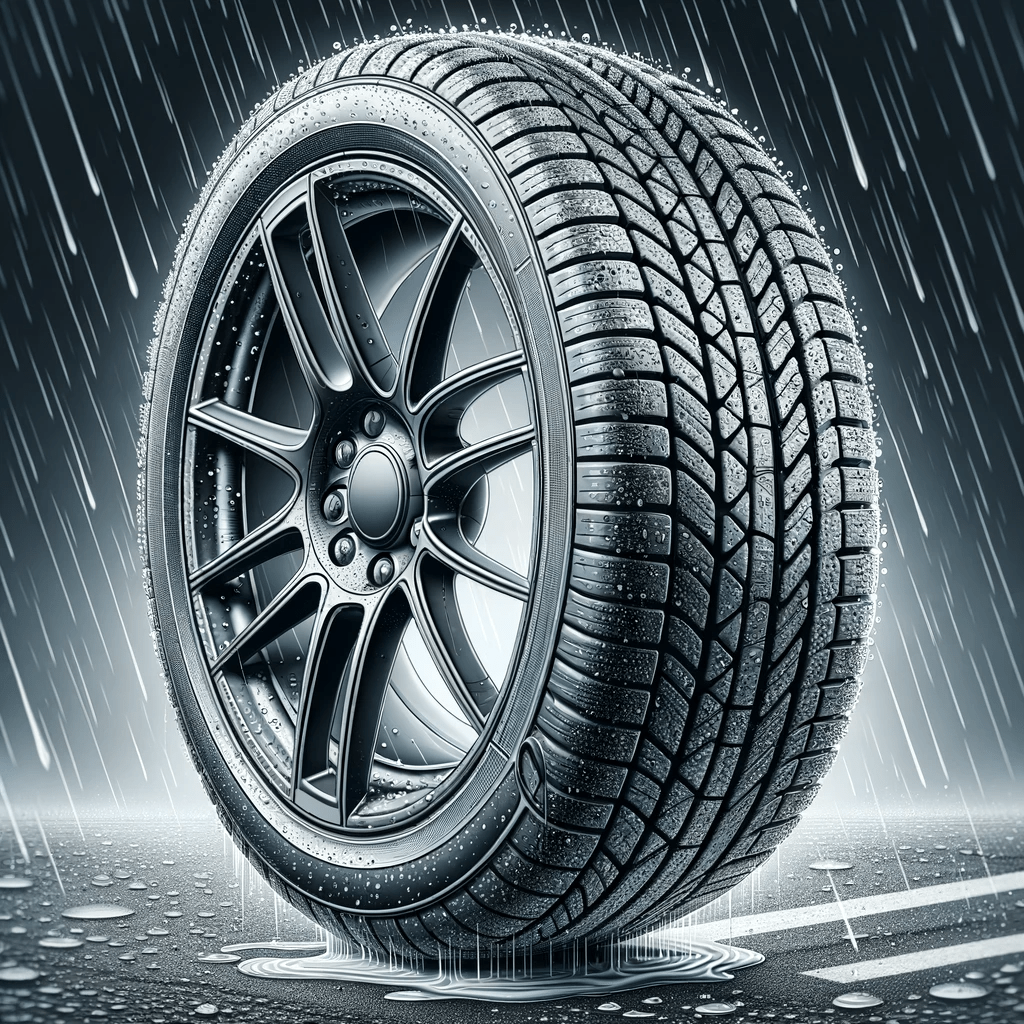Table of Contents
Maximizing Wet Weather Performance for Car Tires
Introduction
Driving in wet conditions presents unique challenges that require specialized tires to maintain optimal traction, handling, and safety. The ability of tires to disperse water, maintain road contact, and prevent hydroplaning is crucial in rainy or damp conditions. Selecting the right tires and maintaining proper tire pressure can make a significant difference in how a vehicle performs in wet weather.
Key Takeaways
- Importance of Tires in Wet Weather: Proper tires enhance safety and performance in rainy conditions.
- Features of Wet Weather Tires: Specialized tread patterns, rubber compounds, and deeper tread depths improve traction.
- Tire Tread Patterns and Water Dispersion: Tread design helps prevent hydroplaning by effectively channeling water away.
- Influence of Tire Pressure on Wet Traction: Maintaining correct tire pressure ensures consistent road contact.
- Recommendations for Selecting Wet Weather Tires: Choosing the right tires involves considering tread design, material composition, and compatibility with your vehicle.

Maximizing Wet Weather Performance: The Crucial Role of Car Tires
Driving in the rain can be dangerous if tires are not equipped to handle wet surfaces. Wet roads significantly reduce friction between the tires and the pavement, increasing the likelihood of skidding, hydroplaning, and extended braking distances.
Choosing high-quality wet weather tires can drastically improve vehicle stability, handling, and safety. These tires are specifically designed to maintain grip and reduce water buildup under the tire, ensuring a safer and more controlled driving experience.
Essential Features of Wet Weather Tires
Tires engineered for wet conditions include several key design elements that improve their ability to channel water away and maintain road grip.
1. Deeper Tread Depths
- How It Works: The deeper the tread, the more efficiently water is displaced from under the tire.
- Why It Matters: Reduces the risk of hydroplaning by increasing water evacuation speed.
- Ideal Tread Depth: A minimum of 4/32 inches is recommended for safe wet-weather driving.
2. Specialized Tread Patterns
- How It Works: Unique tread grooves and sipes channel water away from the tire.
- Why It Matters: Improves traction and braking performance on wet surfaces.
- Ideal Designs: Tires with V-shaped, asymmetric, or directional tread patterns are best suited for wet roads.
3. Advanced Rubber Compounds
- How It Works: High-silica rubber compounds remain soft and flexible in cold and wet conditions.
- Why It Matters: Enhances grip and reduces braking distances.
- Ideal Compounds: Look for tires that feature silica-enhanced or soft rubber materials for better performance in rain.
The Science of Tread Patterns in Wet Conditions
Tire tread patterns dictate how efficiently a tire disperses water and maintains traction. When roads are wet, water can create a thin barrier between the tire and pavement, causing the vehicle to lose grip.
Key Functions of Tread Patterns
| Tread Feature | Function | Impact on Wet Performance |
|---|---|---|
| Deep Grooves | Channels water away from the tire. | Reduces hydroplaning risk. |
| Sipes | Small slits in the tread block that improve flexibility. | Enhances traction and braking. |
| Directional Design | Optimized for water dispersion. | Increases road grip in heavy rain. |
| Asymmetric Design | Different tread designs on the inner and outer parts of the tire. | Balances wet traction and dry handling. |
Tire Pressure: A Key Factor in Wet Weather Performance
Tire pressure significantly affects how a tire interacts with wet roads. Both underinflation and overinflation can lead to dangerous driving conditions in wet weather.
Effects of Improper Tire Pressure in Wet Conditions
| Tire Pressure Issue | Effect on Wet Performance |
|---|---|
| Underinflation | Increases water retention under the tire, reducing grip. |
| Overinflation | Reduces contact patch, making braking less effective. |
Recommended Action: Check tire pressure monthly and adjust according to manufacturer guidelines. Properly inflated tires maintain optimal traction and braking performance in wet weather.
Selecting the Right Tires for Wet Weather
When purchasing wet weather tires, consider:
- Tread Depth: Look for a minimum tread depth of 4/32 inches to ensure effective water dispersion.
- Tread Pattern: Choose directional or asymmetric patterns for maximum traction.
- Rubber Compound: Select tires with high-silica content for improved grip.
- Vehicle Compatibility: Ensure the tires match your vehicle’s specifications.
Comparative Analysis of Tires for Wet Weather Performance
| Tire Aspect | Importance in Wet Conditions |
|---|---|
| Tread Depth | Prevents hydroplaning by improving water evacuation. |
| Tire Pressure | Maintains optimal road contact for better grip. |
| Rubber Compound | Keeps the tire flexible in wet conditions. |
| Tire Size and Type | Ensures the best fit for your vehicle and terrain. |
| Seasonal Variations | Adjusts performance for different weather conditions. |
Expert Recommendations
Choosing the right wet weather tires depends on your driving needs, location, and vehicle type. Some of the best-rated wet weather tires include:
- Michelin Pilot Sport 4S – Ideal for high-performance vehicles.
- Bridgestone WeatherPeak – A strong all-season option with excellent wet traction.
- Goodyear Assurance WeatherReady – Designed for SUVs and trucks.
- Continental ExtremeContact DWS06 – Offers superior wet and dry grip.
Drivers should also prioritize regular tire maintenance, including checking tread depth, monitoring pressure, and ensuring proper alignment, to maximize wet-weather performance.
Final Thoughts on Wet Weather Tire Performance
Wet road conditions significantly increase the risk of accidents, making it essential to have tires that provide maximum grip, efficient water dispersion, and consistent braking performance.
Key Benefits of Using Wet Weather Tires
- Increased Safety: Reduced risk of hydroplaning and better braking response.
- Improved Handling: Optimized tread patterns ensure greater road grip.
- Enhanced Durability: Specialized rubber compounds extend tire lifespan.
- Better Fuel Efficiency: Properly designed wet weather tires reduce rolling resistance.
By investing in high-quality wet weather tires and maintaining them properly, drivers can ensure a safer and more controlled driving experience in rainy conditions. Selecting the right tires tailored to wet weather conditions enhances overall vehicle performance and keeps drivers secure on the road.
Additional Resources
Check out the best performance car gear available on the market.
